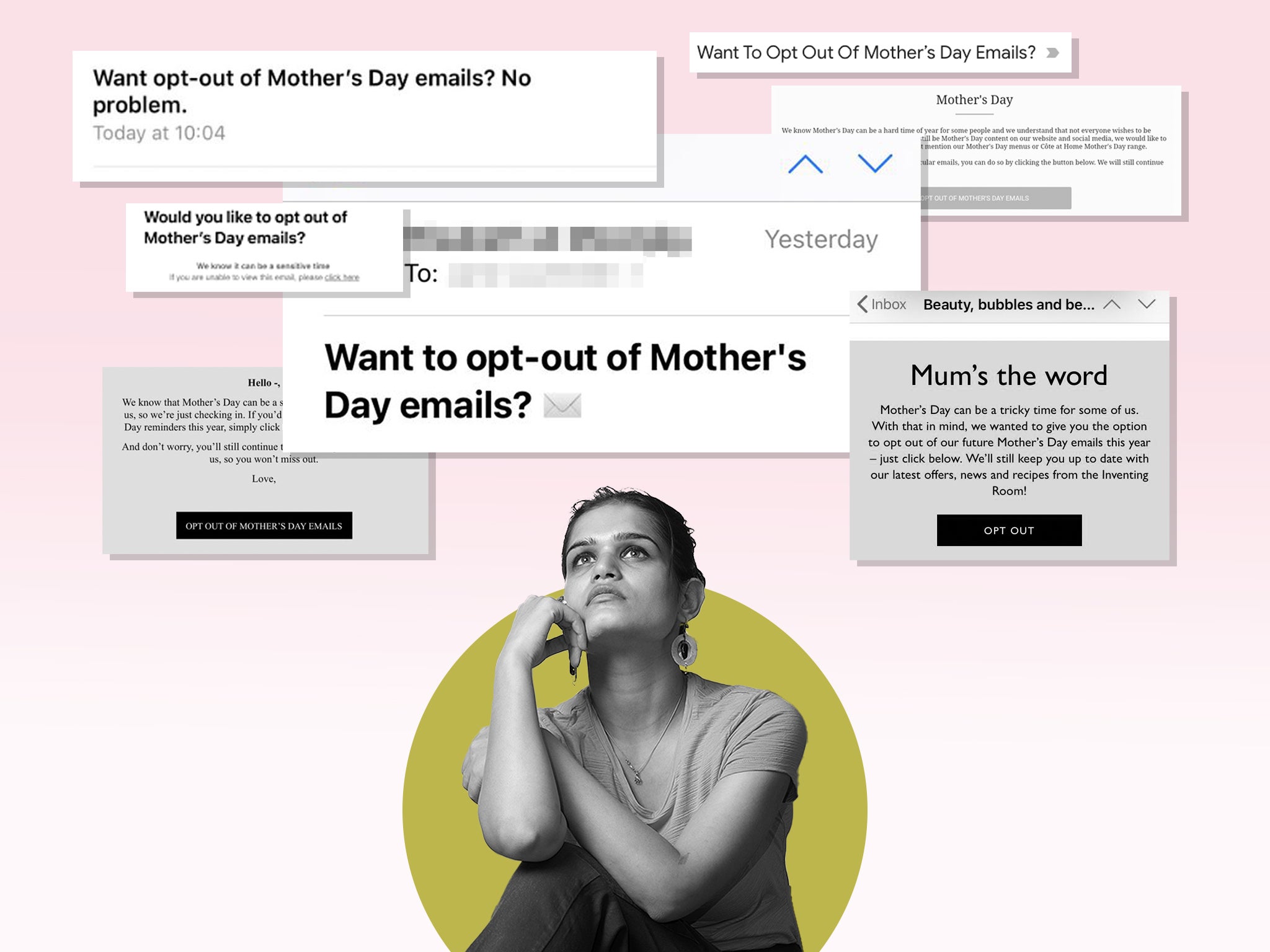‘The last thing you want to see’: The backlash against Mother’s Day opt-out emails
While Mother’s Day opt-out emails were once praised, Laura Hampson discovers they could be as triggering as the emails they are trying to prevent


Your support helps us to tell the story
From reproductive rights to climate change to Big Tech, The Independent is on the ground when the story is developing. Whether it's investigating the financials of Elon Musk's pro-Trump PAC or producing our latest documentary, 'The A Word', which shines a light on the American women fighting for reproductive rights, we know how important it is to parse out the facts from the messaging.
At such a critical moment in US history, we need reporters on the ground. Your donation allows us to keep sending journalists to speak to both sides of the story.
The Independent is trusted by Americans across the entire political spectrum. And unlike many other quality news outlets, we choose not to lock Americans out of our reporting and analysis with paywalls. We believe quality journalism should be available to everyone, paid for by those who can afford it.
Your support makes all the difference.When Laura Woods’ mother died nearly three years ago, the last thing she thought would trigger her grief would be opening up her inbox. Yet, with Mother’s Day on the horizon, the relentless advertising emails she has received are doing just that. “If your mum has died, this is the last thing you want to see. “It’s very triggering, particularly the wording they use in the email subject like ‘Laura, your mum is waiting for her surprise …’” she says.
In recent years companies have started to send emails asking subscribers whether they want to opt-out of Mother’s Day promotional content before the day rolls around. Online florist Bloom & Wild were the first to do so in 2019, a move that received much praise at the time. That same year MP Matt Warman encouraged brands to follow suit. Speaking in the Commons Warman, who lost his own mother in 2009, said that promotional emails ahead of Mother’s Day are a “reminder of what you have lost”. “I know from personal experience the dread that seemingly innocent marketing for Mother’s Day, or indeed Father’s Day, can bring for so many who have lost a loved one,” Warman said at the time.
Brands sending email subscribers opt-out emails for Mother’s Day has since become the norm, but Woods, a publicist herself, says she thinks brands should ask whether people want to opt out of emails as soon at the moment of purchase, rather than being bombarded by the emails each year when Mother’s Day rolls around. “If you think of the pandemic, there have been a lot of people who have lost loved ones,” Woods continues. “[Brands] need to be more conscious with their marketing because at the moment what I’ve seen is pretty shocking and very triggering.”
There are numerous reasons why Mother’s Day can be difficult for some people. Whether you have lost your mum, or you are on your third round of IVF or perhaps you lost a baby, being reminded of a day where motherhood is celebrated can be painful.
The consensus is more or less the same among the Twitter hive mind. One Twitter user told me that the opt-out emails “probably started for the right reasons” but now they find it a “constant reminder of a day they would rather keep very low-key”. Others liked having the option, and one said they find the option to opt-out “incredibly thoughtful”. “It doesn’t cost them anything to do, but can make a big difference to the recipient who is otherwise repeatedly reminded of an occasion they cannot or do not want to participate in,” they added.
That sense of not belonging can cause more grief
Counselling Directory member Carrie Mccoll says that any special occasion can remind us of what we don’t have. “Brands make sales by offering an aspirational lifestyle so these emails highlight what is missing,” she explains. “And maybe even make us feel like we can’t ‘join in’ with their brand if we are not a mother or no longer have a mother. That sense of not belonging can cause more grief.” Mccoll adds that while the opt-out emails can act as a painful reminder, they can also give people the chance to take control.
Lucy Jeffrey, founder of bamboo sock company Bare Kind, said that they saw “quite a high percentage” of people choosing to opt-out of their Mother’s Day emails. “We were quite surprised, and it did mean as a company we were providing a service that meant something to people,” she added. “I had numerous direct emails and social media messages from customers who were super grateful that we did this.”

The cynics among us could see opt-out emails as a form of virtue signalling. “I think these emails come from a good place as I’m sure these brands will have people working for them who are affected by grief on Mother’s Day,” Mccoll says. “But at the same time, we live in a society where being seen to do the right thing is so important and at the end of the day, businesses need to make money and occasions like this are big income generators.”
Companies like women’s social network Peanut are finding new ways to comfort those who may be grieving on Mother’s Day. The app, which began as a platform for new mothers to make friends, recently found in a survey of its users that three in five women (59 per cent) find Mother’s Day emotionally triggering. Instead of emails, this year’s marketing campaign has seen the app post billboards across London which read: “To the women lost in the trenches of postpartum, you’re not alone”, and “To the woman fighting back tears when she walks past the baby aisle, you’re not alone”.
Mccoll says the way we grieve is “such a personal thing”. “There will be those who need to grieve on Mother’s Day, to reflect on losses and that’s ok,” she adds. “Maybe they need to look at the pictures, hear that song or visit that place. But then others may find that too painful and so choose to spend their day like any other. Reminding ourselves what we do have can be helpful.”
One Twitter user, who asked to be kept anonymous, tells me that it “would be genius” if companies could figure out your email preference prior to Mother’s Day.
“I always choose the opt-out feature when it’s offered, because my mum died seven years ago,” she explains. “But having to repeatedly go through the process in the weeks before Mother’s Day is almost as painful as reading the marketing emails themselves.”
Join our commenting forum
Join thought-provoking conversations, follow other Independent readers and see their replies
Comments